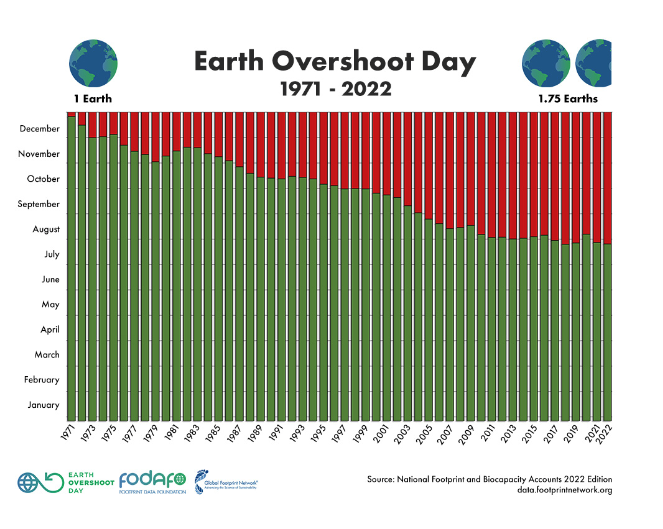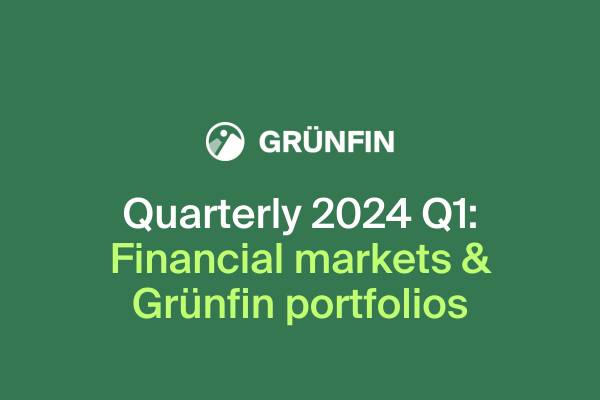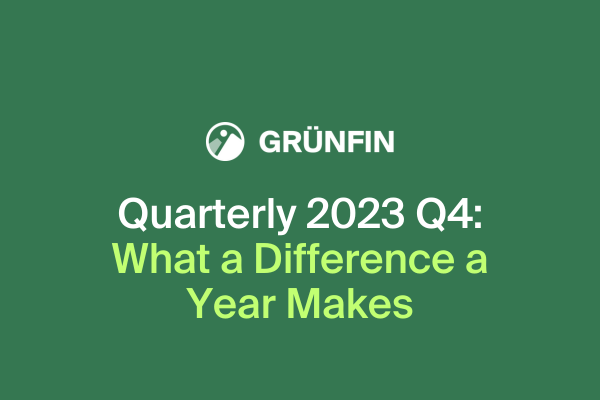Imagine you have a friend who for every 1 euro earned, spends 1,75.
He asks to borrow those extra 0,75 euros from you. You help him out the first year, but if every year he asks to borrow more, his ability to pay you back becomes less certain. We all have this friend! The situation is unsustainable.
Similar to Earth Overshoot Day, which this year, in 2022, has come uncomfortably early - July 28.
What is Earth Overshoot Day?
Earth Overshoot Day is the day on which our resource consumption exceeds Earth’s capacity to regenerate those resources in a given year. In other words, when we have taken more from the planet than what the planet gives us. The earlier in the year we reach it, the bigger our debt to Earth.
As seen on the chart below, in 1971 we were essentially in balance. However, we’ve gotten progressively worse over the years.
By reaching this day on July 28, we require 1,75 Earths to satisfy our consumption!
The problem is we only have one planet, yet we’re consuming the equivalent of 1,75 Earths!

How is Earth Overshoot Day calculated?
Global Footprint Network divides:
- the planet’s biocapacity - the amount of ecological resources Earth is able to generate that year,
- by humanity’s ecological footprint - humanity’s demand of resources for that year,
- and multiplies by 365 - # of days in a year.
Earth Overshoot Day: (Planet’s Biocapacity / Humanity’s Ecological Footprint) x 365
So how can you help Earth? 20 easy tips to reduce your personal carbon footprint.
Many of the things we use leave a footprint, be it at the time of production, transportation, consumption or disposal.
So our footprint is formed from many actions, which may include:
- clothes we wear,
- food we eat,
- phone we charge,
- house we build,
- tea we boil, etc.
Understanding the source of your electricity is also super important - does it come from clean (solar, wind, water) or dirty (coal, oil, gas) sources?
To be clear, we are not telling you what to do. These decisions are very personal, require trade offs and some you might not even consider as doable.
But if you’re looking for tips to reduce your carbon footprint, a few of these may come easy. Find the most suitable for you or try all 20:
- Practice turning the lights off when you’re not in a room.
- Try cutting your shower by a couple of minutes to reduce water and electricity consumption.
- Turn your heating down by a couple of degrees in cold months. If all of Europe did this, natural gas imports would fall by 10%.
- Think twice before throwing out old clothes and buying new ones. Textile production is responsible for about 20% of global clean water pollution from dyeing and finishing products.
- Try a plant-based burger as a substitute for beef, it’s quite tasty! Cattle burps and farts account for 4% of all global greenhouse emissions. Plus cows require land, water and food, which in turn depletes our resources. Shifting some of the beef to plant-based is more sustainable.
- Eat what you buy. It’s not just about the wasted food, but also about all the wasted resources that went into producing and transporting that food!
- Attempt converting your gas stove to an electric one like induction cooktops.
- Be aware when charging gadgets. The electricity used to charge Apple devices represents 22% of Apple’s gross carbon footprint! Perhaps we don’t need all our gadgets fully charged all the time.
- Cut down the cycle time of your washing machine. My machine defaults to a 2-hour cycle time…really?! Use cold water when possible.
- Run or cycle outside when the weather is nice rather than using the treadmills and bicycles in a gym, which consume electricity.
- Get an electric lawnmower to replace that old petrol one.
- Recycle and compost at home and in the office.
- Attempt using your car less. Perhaps by taking the bus, train, cycling or walking. E-scooters are also in fashion, but don’t drive over pedestrians!
- Upgrade to an electric car if your budget permits. Some governments give nice incentives to buy them.
- Install solar panels for your home, which may come with government subsidies and incentives, decreasing the cost of your electricity bill.
- Change your home heating to electric heat pumps, especially if your current system runs on natural gas, propane or oil. Electric heat pumps are critical to reducing greenhouse gases, as per the International Energy Agency.
- Engage with politicians. Push them to focus on climate issues - protection of forests and marine life, investments in clean energy, grants for green companies, subsidies for eco-friendly consumer goods, energy efficient buildings, etc.
- Ask medium and small-sized businesses to align with the Paris Climate Agreement goal of reaching net zero emissions by 2050. Zero by 2050 is what limits global warming and saves our planet!
- Send letters to the world’s largest companies telling them to use renewable electricity. Some giants like Unilever and Apple are already operating their factories, offices, stores, warehouses with 100% green electricity. They install their own solar panels or develop them alongside local governments, benefiting everyone!
- Learn more about this subject. There’s some great books like _How to Avoid a Climate Disaster _by Bill Gates and Speed & Scale: An Action Plan for Solving Our Climate Crisis Now by John Doerr.
Extra tip #21: Greening your finances. What is Grünfin doing to help?
In Grünfin, we are pushing hard to influence the sustainability agenda of some of the world’s largest companies through our activism.
- Call to Credit Suisse: We recently joined a group of investors calling on banking giant, Credit Suisse, to reduce its lending to the fossil fuel sector. This made the news.
- Uncomfortable questions to Deutsche Bank: We also questioned Deutsche Bank, Germany’s biggest bank, at their annual shareholder meeting regarding their possible plans to finance the largest heated crude oil pipeline in the world.
- Tracking Unilever sustainability: We’ve been engaging with Unilever who has committed to increase sales of plant-based foods.
Learn more about our activism through our partnership with ShareAction and more about the actual impact of sustainable investing.
Admittedly, creating change is not easy. But we are passionate and will continue persevering. As one of our favorite quotes goes,
“We are the first generation to feel the effects of climate change and the last generation who can do something about it.”
These could also be interesting to you

Quaterly news from Grünfin 2024 Q1
Grünfin quaterly news about financial markets and Grünfin sustainable portfolios.

Sustainability's highest standard. Grünfin is now a B-Corp
Certified B Corporations, or B Corps, are companies verified by B Lab, third party, to meet high standards of social and environmental performance, transparency, and accountability.

What a Difference a Year Makes (Grünfin Update & Quarterly Statement)
What happened in financial markets in 2023 and how we see 2024?
